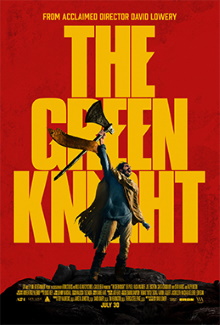This is billed as an epic fantasy film but if you’re expecting an action fantasy movie you would be sorely disappointed as I don’t believe there is a single swordfight in the entire film. It is rather an adaptation of the 14-century poem Sir Gawain and the Green Knight. Without prior knowledge of it, I fear that watching this would be quite a befuddling experience as this was the case for me. Still, the film evokes a feeling of old fantasy before it was completely colonized by games and paperback novels and as such there’s an undeniable lyrical power in it.
Gawain is a knight-in-training whose mother is the sister of the king. Though no names are mentioned, it is implied that the king is Arthur, now very old, and his court is the Round Table in Camelot. On Christmas morning, Gawain is attending the feast at Arthur’s side when a large man seemingly made of wood known as the Green Knight arrives. He challenges the court to a game, inviting any knight to land a blow on him to win his great axe but in return must receive the same blow a year later. Gawain accepts as he has yet to perform any great deeds and Arthur hands him his own sword but the Green Knights refuses to fight and simply offers Gawain his neck. Eventually Gawain decapitates the Green Knight as expected of him but the strange being simply stands back up, collects his head and reminds Gawain that he is to travel north to the Green Chapel a year from now to receive the same blow in turn. A year passes for Gawain in the company of his mistress Essei and soon he must set off for what seems like certain doom. He is given a sash by his mother who promises him that it will protect him from harm and off he goes on his horse.
It is tempting to try to see this as a typical fantasy film with some whimsical elements in the form of the Gothic fonts prefacing each chapter and an odd style but the film resolutely refuses to conform to the usual expectations. Not too long after leaving Camelot, Gawain is tricked by an obvious ruse and waylaid by bandits who are basically children. He is then deprived of his horse and most of his possessions. Not much of a knight that one. He has other strange encounters and adventures as well but it’s hard to discern any common theme there except that this is the kind of inexplicable, seemingly random things that just pops up in stories from the Middle Ages. He survives and travels onwards but never through force of arms. Sometimes it is because he simply perseveres, or is lucky or acts with honor. Most of the time it feels like he doesn’t know what is happening to him either while everyone around him knows much more but they don’t explain anything and act very mysteriously. Nonetheless he continues on his quest as that is what he is supposed to do.
As part of the modern, movie-watching audience, we must still try to wrest such lesson or common theme out of this strangeness. One possibility is Gawain doesn’t seem to have much in the way of strong convictions, and doesn’t even really love Essei. He seems to go along with the quest mostly because it is expected of him and it isn’t until the very end that he gains some measure of wisdom or self-awareness. There are many ways to interpret that but one that I find particularly intriguing is that it may a form of subversion of the myths, that underneath the songs and the stories, reality is still crude and ugly. Gawain remarks early on that he is surrounded by legends but by the end perhaps he realizes that it’s all made up stories. It’s not a particularly convincing interpretation however as I see that director David Lowery has proposed other possible meanings and themes. Mostly I see this as an interesting attempt to bring a medieval poem to the big screen without being particularly concerned about what it actually means.
I do like how the film looks and the how they choose to use ethnic actors to represent familiar characters out of Arthurian legends. But I like the boldness behind this project more than the film itself. Recently very well known directors including Francis Ford Coppola have come out complaining how Hollywood only gives funding to MCU-type movies. The very existence of this film makes for a solid counter-argument. More esoteric projects will have to make do with smaller budgets and Coppola likely wanted too much money for his own projects, but it is possible to make all kinds of weird films.
